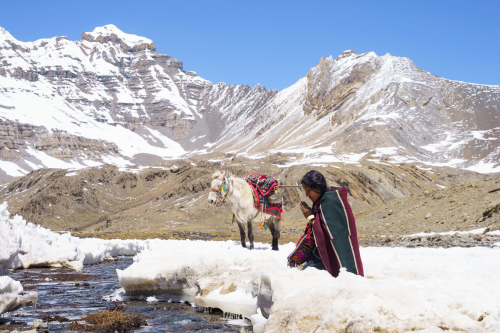
Aditya Basnet/Shooney Films
MOVIE REVIEW
Shambhala (2024)
It must be easy to be a cinematographer in Nepal. You take a camera outside, point it at nearly anything, and let the astonishing mountain scenery do the rest of the work. It’s so gorgeous it’s a surprise “Shambhala” was the first Nepalese movie in competition at the Berlinale, although that rather minimizes Aziz Zhambakiyev’s beautiful work. But in face of such beauty it can be tough not to lose sight of the plot.
Pema (Thinley Lhamo) is very happy on her wedding day, even though she is taking three husbands in a village away from her kind and gentle family. The main husband is Tashi (Tenzin Dalha), a trader and stonecarver, and such a cheerful charming man there’s no question why he and Pema are so attracted to each other. The other husbands are Tashi’s brothers, Karma (Sonam Topden), a withdrawn Buddhist monk, and the 11-year-old Dawa (Karma Wangyal Gurung). Pema and Dawa treat each other with appropriate sibling-style affection only, don’t worry. After the wedding Karma returns to the monastery and Tashi must shortly go on a business trip to Lhasa, which means he will be away for months. In his absence Dawa starts acting the brat in school, and so Pema, who is smarter than her men realize, goes to speak with his teacher, Ram Sir (Karma Shakya), the only ethnic Indian in the village. But of course the friendship that immediately springs up between Ram Sir and Pema doesn’t go unmarked, and that means Pema’s happy and hoped-for pregnancy suddenly has a question mark over it.
Though their village is remote, spiteful gossip travels, so Tashi doesn’t come home from his trip. Pema is distraught, but also resolute: She was faithful and if Tashi doesn’t believe her, well, she will just go find him and tell him herself. She takes the pony and sets out, but when the Rinpoche (Loten Namling) of Karma’s monastery finds out, he insists: Karma must accompany her. Neither of them are thrilled about this; Karma hates to be away from the monastery and Pema doesn’t want an audience for her personal business. And anyway Karma never learned how to ride. But the Rinpoche must be obeyed, and soon Karma and Pema, and the little pony, are walking together, following rumor and conjecture around the mountains as they search.
Director Min Bahadur Bham, who cowrote the script with Abinash Bikram Shah, is interested in how Pema’s relationship with Tashi and her separate-but-equal one with Karma become the tools with which she builds her relationship with herself. Ms. Lhamo’s calm assuredness means we believe her utterly when Pema names the father of her baby, meaning we are wholly on her side as she traverses the snowy hillsides or huddles by the fire at night. Mr. Topden has the most interesting part, as a man who suddenly has the freedom to choose between religious solitude and a happy family with a caring partner, but he also makes it clear that for Karma this choice is not a happy one. He likes Pema, to his surprise; and he could easily love her if he wanted to, but perhaps being a family man is not his calling. The four sound artists are mentioned first in the opening credits and their superb work does an enormous amount to make the windy wilderness around Pema as palpable as the snow crunching under her boots. Though honestly, this movie is so beautiful you could just watch it with the sound off, as the prayer flags flutter in the breeze, or Pema accepts a blessing from the Rinpoche.
And for once the ending works perfectly. Pema is asked – well, told – she has to make an unfair and unhappy choice; and she responds by choosing herself. There are no big scenes, no enormous gestures, but her resolve and drive for justice are quietly right there, all along. What’s a few months walking over mountaintops while heavily pregnant if that’s the right thing to do? It’s this self-assurance that remains from “Shambhala” along with that scenery.
Comments